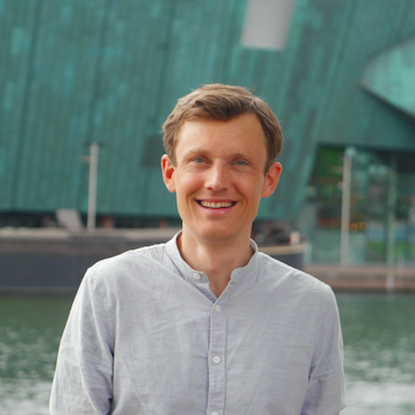Energie Lab Zuidoost is a workspace in which local government, scientists and social partners work together in projects with neighborhood residents to accelerate the socio-technical energy transition toward Amsterdam Zuidoost Energy Neutral in 2040. More info (in Dutch).
Schrijf je hier in voor het seminar.
Keynote Speakers
Otas Elum is the first keynote speaker. Among other things, he is the founder of the Energy Transition General Knowledge Centre, which aims to share knowledge with hard-to-reach groups in Amsterdam Southeast.
Richard Ruijtenbeek is the second confirmed keynote speaker of the afternoon. He will summarize the updated Visie Zuidoost Energieneutraal 2024, showing key results over the past five years and the main challenges to reach energy neutrality in 2040.
Panel discussion ‘Five years Energy Lab South East’ with Gijs van Leeuwen (TUD), Charissa Leiwakabessy (UvA), Stan Majoor (HvA), Annoesjka Nienhuis (City of Amsterdam), Paul Voskuilen (AMS Institute). Key question: what have you learned and what are you proud of? Talking about their daily work in the Energy Lab, these representatives of the five partners uncover the workings of the Energy Lab and lessons for initiatives elsewhere as well as for the future of the Energy Lab itself.
Poster presentation pitches: a selection of current researchers will plenary pitch the highlights of the poster that they are presenting this afternoon about their particular research. The posters are exhibited in the main area downstairs from lunch until the drinks.
Break-out sessions
After these keynotes, there are possibilities to participate in the following break-out sessions:
Bike tour through South East by Daan Dekker
Daan Dekker, author of ‘Stad van de toekomst’, takes you through South East by bike. In two hours, Daan talks about the special urban planning of the Bijlmer. The tour covers both the past and the future, with a special focus on the energy transition and the social aspects involved. The tour passes places such as the former Gliphoeve and K-plein, where various sustainability initiatives come to life.
Practical solutions for energy poverty
Including !WOON Energiecoaching, de Energiebespaarservice Zuidoost and researchers from MIT and WUR affiliated to AMS Institute.
Energy poverty has been a well-known phenomenon since the energy crisis. Many people with low-income live in Southeast, moreover, research shows that several other contributing factors are also above average in Southeast (loneliness, elderly, language, etc.). In turn, the label level is better than the city average. From the Energy Lab, a lot of action research has recently focused on energy poverty and interventions such as energy coaching. Foundation !WOON and the Groene Hub have been working in the neighbourhoods with energy coaches and quick-fixers for years. That deployment is only growing. At the same time, we do not yet know much about the long-term effectiveness of these measures, especially when it comes to behavioural change, cultural differences and language problems.
Aim of the session
Just Prepare, Energy Justice & case K-torens
Including HvA, Lieven de Key, Hart voor de K-buurt, City of Amsterdam
In this break-out session, we will zoom in on energy justice by looking at the K-Torens renovation process. Mike Brantjes from Hart voor de K-buurtwill open the break-out session. He will take us through the case study of the K-Torens renovation and the role the neighbourhood played in it. This will be followed by a panel discussion with Mike, a researcher from the HvA, a representative of the municipality and the project manager of Lieven de Key. Together with them, we reflect on the following questions:
Housing renovation dilemmas
Including Stadgenoot, TU Delft, Stichting WNR and City of Amsterdam
In this break-out session, a panel with academics and practitioners will search for ways out of the conundrum that many housing renovation processes face. A typical and very up to date case in South East will be taken as an example. Here, 10 complexes need to be renovated and insulated. These are 240 homes of mixed ownership, with an average of 60% owner-occupier and 40% housing corporation. A lot of time has been put into placing ownership with owner-occupiers. Several attempts were made to draw up a plan to renovate the complexes, but previous plans did not materialise, partly due to lack of money. Recently, a new plan is established with creative technical and financial solutions, however, it remains difficult to align all different stakeholders and to get final approval to execute the plan.
Aim of the session
Schrijf je hier in voor het seminar.
This event will be in Dutch and is organized by AMS Institute, Gemeente Amsterdam, TU Delft Urban Energy Institute, UvA, HvA and Groene Hub.
